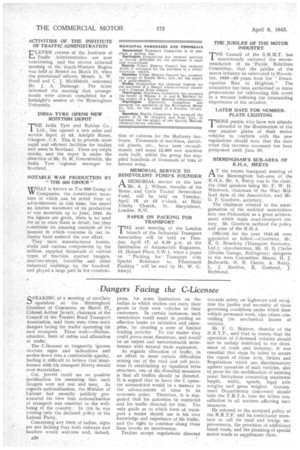Dangers Facing the Glicensee
Page 22

If you've noticed an error in this article please click here to report it so we can fix it.
Q PEAKING at a meeting of ancillary
operators at the Birmingham Chamber of Commerce on March 27,, Colonel Arthur Jerrett, chairman of the Council -of the Traders Road Transport Association, said there were three main dangers facing the trader operating his awn transport. These were:—Nationalization, limit of radius and allocation of traffic.
The C-licensee so frequently ignores obvious signs and indications and settles down into a comfortable apathy, finding it difficult to believe that interference with his transport liberty should ever materialize.
, Col. Jerrett could see no possible justification for assuming that such dangers were not real and near. As regards nationalization, the Minii-ter of Labour had recently publicly pronon aced his view that nationalization of transport was essential to the wellbeing of the country. In this he was voicing only the declared pokey of the Labour Party.
Concerning any limit of radius, signs are not lacking that both railways and hauliers would welcome and, indeed, press, for some limitations on the radius to which traders can carry their goods in their own vehicles to their customers. In certain instances, such restrictions could result in putting an effective brake on initiative and enterprise, by creating a zone of limited trading activity. To the trader they -could prove most disastrous, and would' be an unjust and unwarrantable inter-ference with natural trade expansion.
As regards allocation of traffic, in an effort to meet certain difficulties arising out of the road and rail problems in establishing an equalized rates structure, one of the remedial measures is that all traffics should be directed. It is argued that to leave the C opera • tor unrestricted would be a menace to the advancement of rates to an economic point. Therefore, it is supgested that his activities be restricted and his traffic directed for him. The only guide as to whiCh form of transport a trader should use is his own knowledge and experience of his traffic, and the right to continue along these lines brooks no interference, Traders accept regulations directed towards safety on highways and recognize the justice and necessity of those. governing conditions under which their vehicle personnel work, also others controlling the mechanical fitness of vehicles.
Mr. F. G. Bristow, direcebr of the N.R.T.F., said that to ensure that the operation of C-licensed vehicles should not be unduly. restricted to the detriment of. trade and industry, it was essential that steps be taken to secure the repeal of .those Acts, Orders and Regulations which are, discriminatory against operators of such vehicles, also to press for the modification of existing penal limitations concerning maximum length, width, speeds, legal axle weights and gross weights. Government Departments concerned should take the T.R.T.A. into the fullest consultation in all matters affecting such measures.
He referred to the accepted policy of the N.R.T.F. and its constituent members to call for road and bridge improvements, the provision of additional trunk roads, and the planning of special motor roads to supplement them.




















































